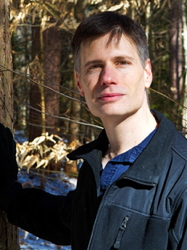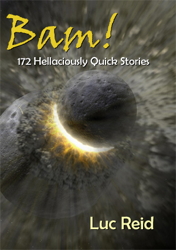
As part of the many services I offer, I’m going to be doing some Q&A with various writers who have projects coming out. The hope is to introduce you to some people you may not have heard of, maybe even generate a little bit of buzz. All part of paying it forward. My plan is to post them on Friday mornings. I hope you find them enjoyable.

Q&A with Luc Reid:
According to his bio, Luc Reid is a Writers of the Future winner whose fiction and nonfiction have also appeared in Clarkesworld, Strange Horizons, Abyss & Apex, and other venues. He’s the founder of the Codex online neo-pro writers’ group at www.codexwriters.com; author of Talk the Talk: The Slang of 65 American Subcultures; a founding member of flash fiction group The Daily Cabal, on which site well over a hundred of his stories have appeared; a former radio commentator for Jacksonville, Florida NPR affiliate WJCT; and a columnist for Futurismic with his Brain Hacks for Writers series.
What his bio doesn’t reveal is that long ago, in a small liberal arts college far away, Luc was an undergraduate in one of the first classes I ever taught, back during my professor days. The experience doubtlessly scarred him, and many years later while attending a WotF workshop he happened to be chatting with another author who mentioned knowing someone who was working with Klingon. Through some intuitive leap, Luc realized I had to be that someone and he contacted me and asked me to be part of a new online community he was forming. My contribution was to come up with the name, Codex, and to remind people about it ever since.
Recently, Luc has self-published Bam! 172 Hellaciously Quick Stories, a collection of his flash fiction. That struck me as a fine reason to throw a few questions at him.
LMS: In no particular order, some flash questions about flash fiction: Why flash? What do you find easier about writing flash than writing more traditional length short stories? What do you say to readers who dislike Flash because far too much of it seems to rely on a gag ending? Is Flash something you hope to be known and recognized for, or is this all an experiment you’re doing?
LR: I like those questions, because there are a lot of reasons I write flash. One is that I have literally thousands of writing ideas jotted down, with more coming every day. If I didn’t write a huge number of stories, many of the ones I’m most keen to try would go to waste. (Actually, many still do.)
Another reason is practice. If I write one 7,000-word short story, I have practiced beginning a story, ending a story, establishing a setting, etc. exactly once. If I write six 400-word stories instead, I get to practice all of those things 6 times, although I admit not to the same depth each time. If I had stuck only with traditional-length short stories, I probably would have authored only a few dozen by now, but with so much work on flash, I’ve written well over 200. Doing this has given me the freedom to experiment a lot more and try new things, like my Dick and Jane-style story (“One Hole Goes In. One Hole Comes Out.”), a story written in the style of Ernest Hemingway from the point of view of a kudu (“Hunting for Ernest Hemingway in Kudu Heaven”), a tech bulletin (“Tech Bulletin: Vulnerability Found in Humanity 3.5”), or a bunch of post-it notes (“A Series of Notes Stuck on the Refrigerator of a Small Universe-Hopping Cooperative”).
One thing that amazes me about flash, by the way, is that I’m still not running out of names for my characters. I would have thought I’d be repeating long before this, but nope: I’m still mining my memories of high school and coming up with what I need without much repetition.
In theory, writing a lot of flash fiction also gives me a lot more work to send out, but in practice marketing the stories often takes a lot longer than writing and polishing them, so I often don’t get around to it.
About gag endings, I feel they get old pretty quickly. I have a couple of pieces that work that way in my collection Bam! 172 Hellaciously Quick Stories, but they are very unusual gags which I hope pay off (and get a laugh) simply from their strangeness. While many of the other stories have humor, mostly they are certifiably gag-free.
I definitely intend to keep writing flash, though I don’t know if I’ll keep up the pace I’ve been going, averaging 1 or 2 a week for the past few years. I love the form, and it’s possible to get away with all kinds of things that couldn’t be done at a few thousands words.
LMS: Some years ago, you started the online writing community Codex: Could you sum up its origins in a couple sentences, and then discuss how it has changed and grown from it’s original conception. Do you feel it still serves its original purpose? Where do you see it going?
LR: Codex has been a very surprising experience for me in that it rapidly turned into exactly what I was imagining: a gathering point for authors who were skilled enough to have some accomplishments but humble enough to be looking to improve their work. I really do think that even the most accomplished writer can still get better, so to me, it’s the mark of a professional when someone has seen a little success and still really wants to learn.
Codex was started by pulling together graduates of Orson Scott Card’s Literary Boot camp along with a couple of years of Writers of the Future winners. These were two talented, motivated, highly compatible groups of people who had proven to the judges and/or Orson Scott Card that they could write, so there was no need for us to have to vet members individually: we leave that to people who run magazines, publishing houses, and pro workshops.
The original purpose was to create a constructive conversation among a lot of talented writers for mutual improvement. Codex seems to be doing that in spades, yielding publication after publication … and in the past couple of years, members have even won major awards (including Will McIntosh’s 2010 Hugo, for instance). I know for certain that my own writing is much further along than it could possibly have been without Codex. I plan and hope for it to continue to serve that purpose, to be a way for us Codexians to continually up our game in the company of people we admire.
Other than the sheer number of participants (181 active members at the moment), the thing that has changed the most over time is the number of things we do: contests, critique methods, gatherings … and this blog tour, for instance. Actually, we do so much that even some of the most popular features (like the Codex Writer’s Workshop) that take a fair amount of work can’t always be continued regularly. Fortunately, the core features are self-perpetuating.
LMS: Your work seems to be all over the place. You published a book on subculture slang, now you’ve put out a collection of ultra short stories, and then there’s your work on the willpower engine website. What’s the common thread that ties this all together, and can it be used to predict where you’ll be turning up next?
LR: I’ve long had a lot of diverging interests, and it has tended to get me involved in more projects than I have time for. But your instinct that there’s a bond tying them together is a good one: it’s all about understanding people. Researching Talk the Talk: The Slang of 65 American Subcultures taught me a lot about how different people think, that motorcycle riders often call cars “cages,” that model rocketeers have a rich vocabulary for disaster, that there’s such thing as perky goths, and so on. The Willpower Engine digs deeper by way of psychological research into what gets us doing or not doing the things we want to do. My flash fiction has been a mental playground for trying to use what I know, and so the stories are full of relationships: love, divorce, uneasy alliances, friendship so deep that one friend would stop getting high with Heidi Klum in Heaven in order to help a friend in Hell, a marriage to infinite versions of the same person, and so on. The strange situations are just ways to poke and prod the fabric of human connections.
As to what comes next, it’s convergence! Using a lot of the fiction skills I’ve been honing in my short stories, I’m planning out a novel that is intended to offer a story that will suck the reader in while also revealing the mechanics of self-motivation through the main character’s experiences. I’ll be pulling out all the stops for this one, and for the first time in years, I’ll be working on only one kind of writing at a time.
LMS: More than 20 years ago you were a student in one of the first classes I taught during my time as a college professor. Now look what happened! How do you account for it? Hindsight is a beautiful thing, but does your current life follow the path you imagined for yourself back in those halcyon days of yore, or is every day a complete and delightful surprise? Or is this just an obligatory fourth question?
LR: To some of those questions, yes. To others, I’d like to talk with my lawyer before answering. By the way, did you know that I used some of the things I learned in your psycholinguistics class in fashioning the world for “Bottomless,” the novelette that won me a Writers of the Future award? True story. (The protagonist’s local language, by the way, had been invented long before by hobbyists to give the effect of a drum circle when people were speaking it.)
My life has definitely not followed the course I imagined for it–but when I was doing the imagining, I thought the standard thing was to sell one book and become well-off from it before you’d even started your second. I was more than a little naive about the world of publishing, and even lo these couple of decades later there’s still much to learn.
Actually, I would have a hard time pointing to a single major thing I’ve done over the past 20 years that happened the way I expected, and yet look how wonderfully it’s turned out for me! I have an essentially livable income, I get to write and be read, I have a family that rocks my world, and I still am in conversations with really interesting people I met in the 1980’s. Oh, and I’m now a black belt. And I lost a lot of weight. And I have my own column in an online SF magazine. I get movies streamed on demand to my television, I own a car that runs partly on electricity, I can shop for and read books from a device smaller than a trade paperback, and I can get information on practically any subject I want to by typing a few words into a computer that doesn’t even have to be plugged into anything. As I strongly suspected while reading SF in my childhood, living in the future is awesome.

And that’s Luc Reid, now it’s time for the commercial: Writers need readers, and if you found Luc’s responses in this Q&A interesting, why not not click on the image to the left and order yourself an e-copy of his flash? Thanks!

